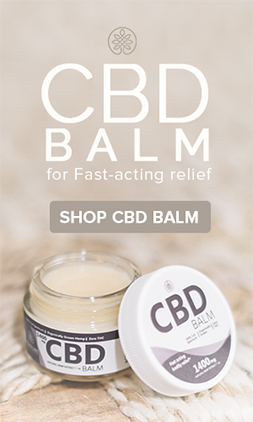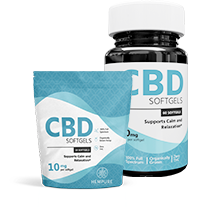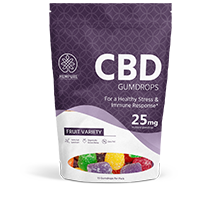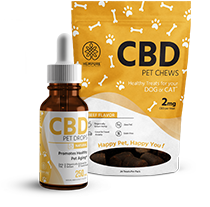What does ‘self-medicating’ with alcohol mean?
Sabina King on Apr 4th 2020
Over 15 million people in the United States struggle with alcoholism, but less than 8% of those receive treatment for it. What is alcoholism? A widely accepted benchmark is the (consistent) consumption of more than 7 drinks a week for a woman or 14 for a man. April is Alcohol Awareness Month, which doesn’t just mean recognizing those who currently struggle with it, but also those that are at risk of developing the condition. One of the many reasons that people may turn to alcohol is in order to cope with life’s difficulties, also known as ‘self-medicating’ with alcohol. The process of self-medicating can often be slow and spotted early, whether in oneself or in others. Let’s delve a little deeper into this phenomenon as well as exploring better ways to deal with stress.
What does self-medication mean?
Broadly speaking, self-medication is the act of taking any unprescribed substance in order to ‘treat’ or cope with physical or psychological distress.
What are the substances chosen when self-medicating?
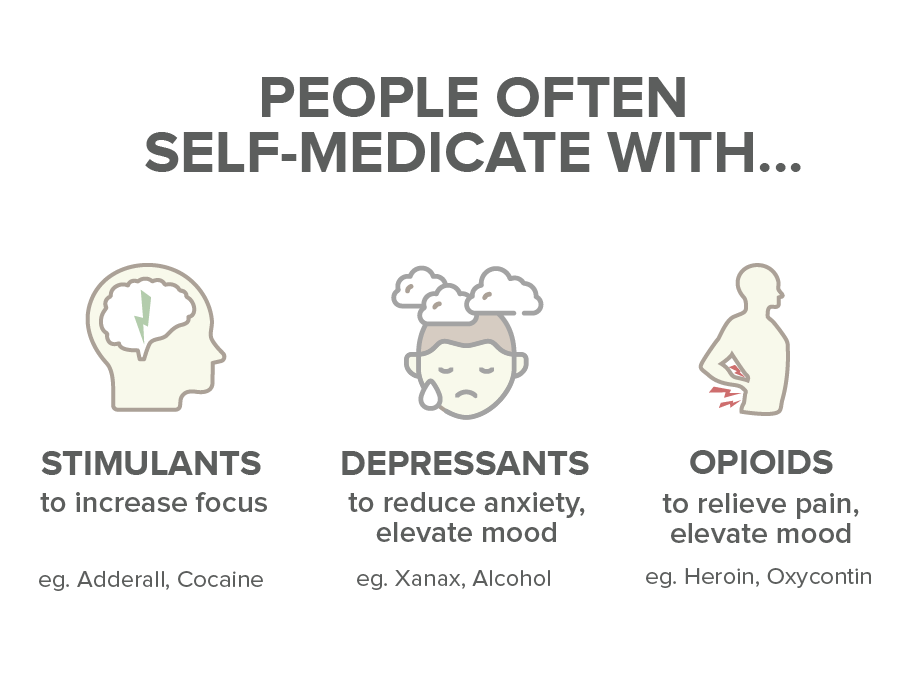
- Stimulants (ADHD medications, cocaine, etc) to increase focus and energy or to combat fatigue and depression.
- Depressants (alcohol, benzodiazepines like Xanax or sleeping pills like Ambien) to decrease stress, elevate mood or induce sleep.
- Opioids to relieve pain, depression or stress.
You’ll find that some of the above are prescription drugs, like Xanax or Ambien, while some are illicit, like cocaine or meth. Alcohol, on the other hand, is both legal and widely available, which means it’s especially easy to kickstart the process of self-medicating using alcohol.
Why do people self-medicate with alcohol?
There’s a pretty high correlation between mental illness and substance abuse disorders like alcoholism, which seemingly indicates that individuals are very likely using alcohol to cope and/or feel better. In fact, much like non-alcoholics view legitimate medications as a good strategy to cope with illness, alcoholics may genuinely believe that they are effectively solving their problems.
What are the issues that people may self-medicate for?
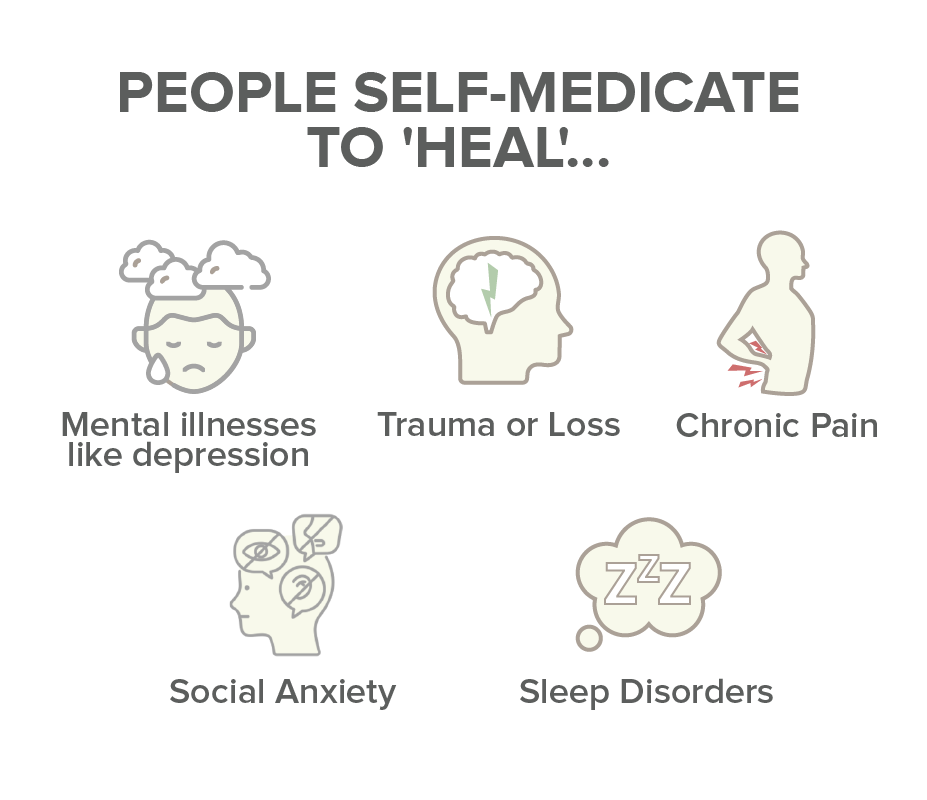
- A mental illness like depression or stress.
- Trauma or loss.
- Shyness.
- Pain
- Sleep disorders
An umbrella term for all the above might be stress. In the absence of effective coping mechanisms, people turn to alcohol in order to deal with stress. The National Institute on Drug Abuse has also talked extensively about the connection between stress and substance abuse.[1]
What is the connection between trauma and self-medication?
Stressors like bereavement and trauma can often steer people towards alcohol or drugs. In individuals who have abstained from drugs for a while, it can also lead to relapses. Serious trauma often triggers PTSD or Post-traumatic Stress Disorder, which comes with symptoms like sleeplessness, stress and avoidant behavior.
The link between PTSD and alcoholism is pretty clear. Among people who abuse alcohol, a large proportion also meets the criteria for PTSD. In these populations, alcohol provides an easy, inexpensive and fast way to cope with pain and stress. It allows an escape from reality, albeit short-lived.
Why is alcohol used to deal with trauma?
PTSD, stress disorders and depression may often present with an overactive amygdala and prefrontal cortex. Alcohol, as a central nervous system depressant, could actually reduce activity in these areas and provide temporary respite from the stress. Eventually, of course, withdrawal from alcohol itself can cause the same feelings of stress, keeping individuals addicted to alcohol so that they don’t have to deal with withdrawal.
What are the dangers of self-medicating with alcohol?
The primary risk would obviously be alcohol abuse. This occurs because repeated alcohol use can alter brain chemistry as dependence grows. When alcohol is no longer consumed, the brain can’t function as it normally does, leading to stress or pain that is much worse than it was to begin with.
Drinking can also interfere with other medications an individual might be taking, increasing the risk of adverse side effects.
What are signs that you or someone you know might be self-medicating with alcohol?
- When you’re stressed, sad, angry or experiencing any other uncomfortable emotion, you reach for a drink. Having a drink after an exhausting day may not seem out of the ordinary, but if it’s a regular occurrence, it may be cause for concern.
- Your body and mind suffer as a result of your alcohol use. When alcohol use impacts your immune system, sleep patterns, and mental health, it’s a good sign that it’s interfering with your well being and doing more harm than good.
- You want to hide your drinking. It may be just so you don’t cause unnecessary worry in those that care about you, but if you’re getting more secretive about how you spend your time and hide how much you’re drinking, it might be because you believe people won’t understand that alcohol is helping you feel better.
- You worry when you can’t drink. If the idea of getting through a party or even a long period of alone time without a drink is extremely off-putting, it’s a good sign you’re self-medicating to deal with some kind of discomfort.
- It’s interfering with your life. When alcohol use starts to become an issue in itself, it starts manifesting itself in relationship problems, financial difficulties, or problems at school or college.
- Those close to you are worried. Even if you haven’t necessarily considered the idea that you may have a problem, it’s worth it to listen to people around you with an open mind and consider their points.
Better ways to cope with life’s difficulties.
When a major life event compels one to find ways to cope, there are many healthier alternatives than self-medicating. Of course, this list doesn’t include legitimate medication under the guidance of a licensed medical professional – in many cases, that can be the best option to explore. However, other ways to cope with stress may include:
- Recognizing the difficult emotions that you feel. Before you can start to overcome the emotions that are fueling self-medication, you must recognize them. Often people aren’t aware that they’ve been self-medicating – they simply haven’t given it that much thought.
- Therapy. Working to overcome difficult emotions is easier said than done, but there are plenty of tools to help. Therapy, particularly cognitive-behavioral therapy or CBT has shown promise in helping people change their approach to stressors in order to deal with them in healthier ways.
- Journaling. Journaling may be an effective way to sort out complicated thoughts and feelings in the mind. Numerous studies have shown that journaling can help people prioritize their problems, understand their fears, chart their moods and recognize their patterns of thinking.
- Meditation/mindfulness. Practicing meditation, particularly mindfulness meditation has shown immense promise in changing the way one thinks. It can lead to less severe stress responses, and in the process also sharpens brain function and memory (which is an excellent bonus!).
- Physical activity. Working out to deal with stress can be hard when you don’t even want to get out of bed, but physical activity does not necessarily mean exercise. Even 10 minutes of physical activity a day – a brisk walk, some jumping jacks, anything to get your heart beating a little faster – can help. While it may not feel better instantly, the long-term benefits are undisputed.
- Try some CBD. CBD or cannabidiol can provide some relief in stressful situations and even help support healthier stress responses. The priority remains to identify and to change actual thought and behavior patterns, but CBD can help support other steps you’re taking to deal with stress.
Self-medicating with alcohol is dangerous and will only make things worse in the long-term. Eventually, alcohol withdrawal becomes the symptom for which one must self-medicate, creating an endless loop. If you or someone you know is self-medicating, it’s best to seek help sooner rather than later. Find out more about Alcohol Awareness Month here.
[1]https://archives.drugabuse.gov/publications/community-drug-alert-bulletin-stress-substance-abuse












